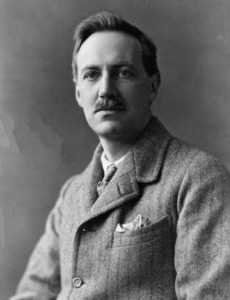A handful of influential writers cast long shadows over the fantasy genre. The core fantasy reader has always been fond of the familiar trope, eager to revisit comfortable archetypes. The influences of Lovecraft and Tolkein loom especially large in that landscape. Both writers can claim that unique privilege afforded to literary greats–their names have been turned into adjectives. Yet the themes of what define the “Lovecraftian” and the “Tolkeinesque” could not be more different; the despairing cosmic nihilism of the Cthulu mythos is the antithesis of the heroics of Middle-Earth.

Edward John Moreton Drax Plunkett, 18th Baron of Dunsany
But both authors are united in one thing. They acknowledged the tremendous influence of one writer on their style: Lord Dunsany.
Lord Dunsany is almost unknown today, but in the early decades of the twentieth century he was among the world’s most popular writers. He published at least eighty books in his life, plus eight collections of poetry. At one time he had five different plays running simultaneously on the New York stage. His appeal transcended the modern constraints of genre, and his contemporaries and associates included names like Rudyard Kipling and William Butler Yeats. Yeats was in fact to edit some of Dunsany’s work, and personally solicited plays for the Abbey theater. Dunsany, said Yeats, “transfigured with beauty the common sights of the world.”
Dunsany was born to the Anglo-Irish nobility. The ‘Lord’ was not an affectation but a fact; he held the second-oldest peerage in all Ireland. More rightly named Edward Plunkett, he elected to publish his work under his more poetic-sounding title. His first book’s printing was financed out of his own pocket. Such was its success that he would never again need to foot his own bill.
Recent Comments